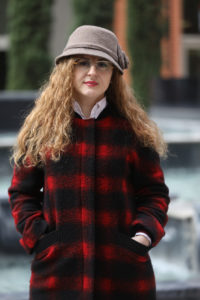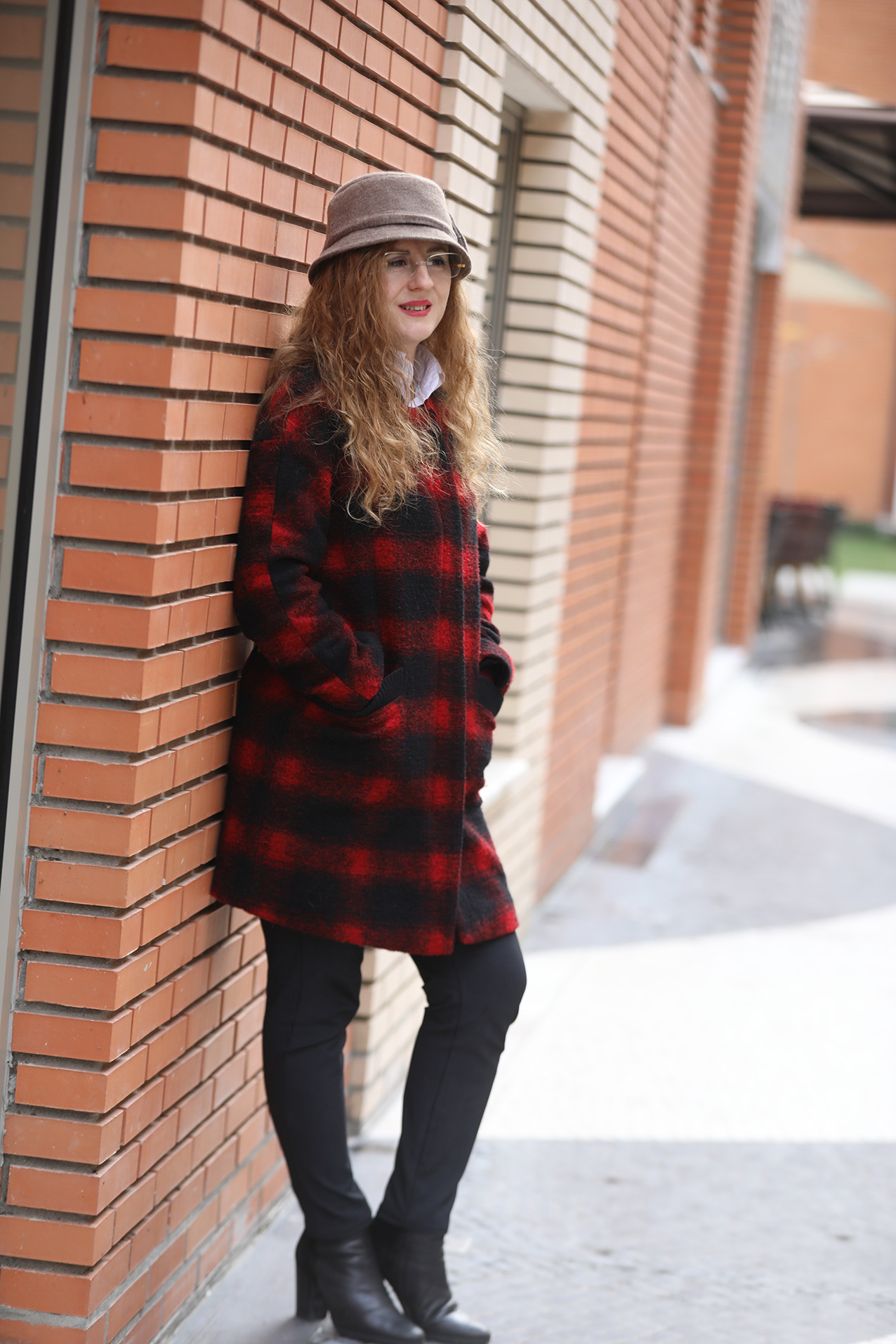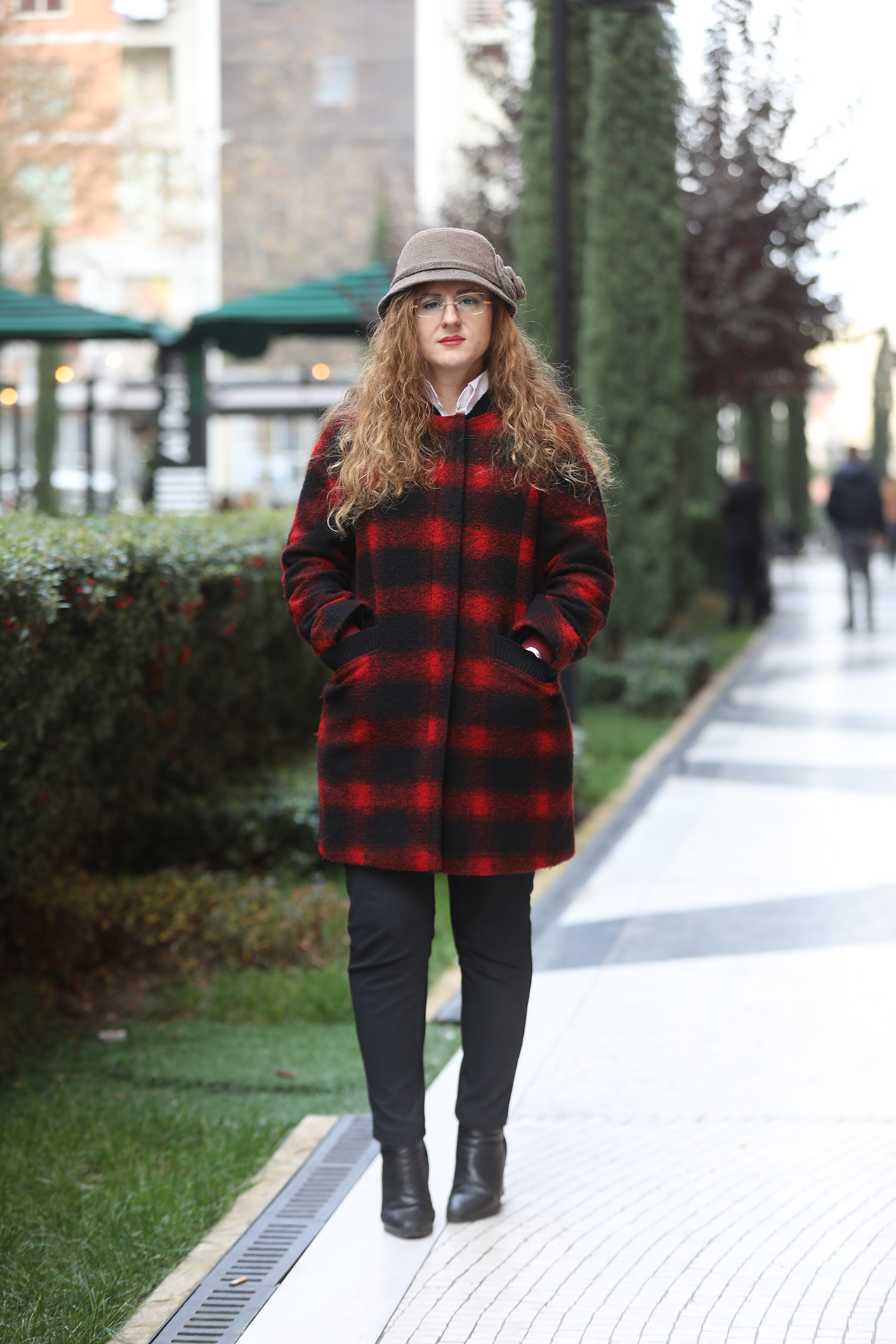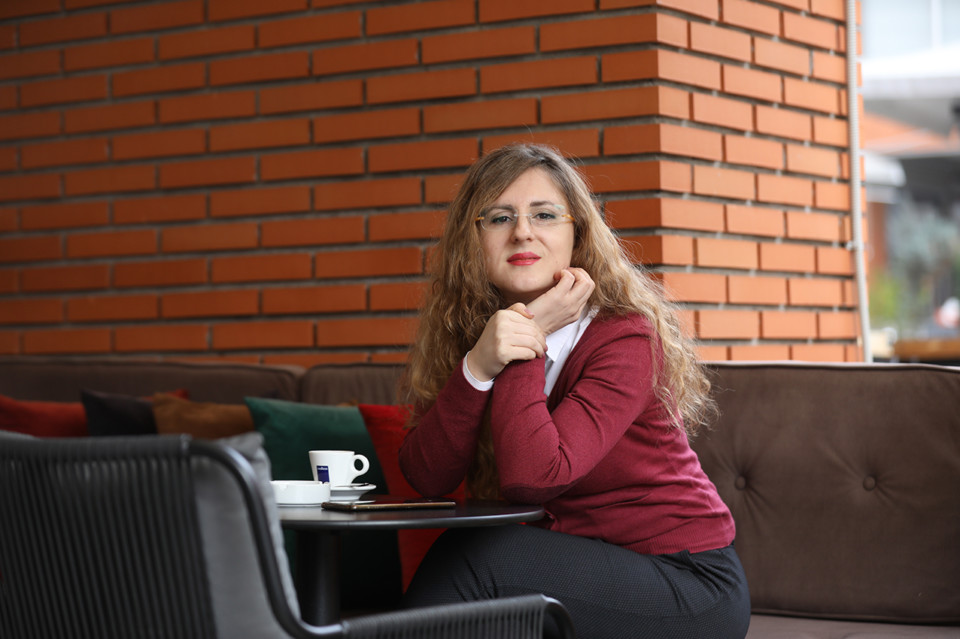S U E L A
Tirana | 2019

S U E L A
City — Tirana
Age — 33
Love life — Single
Profession — Legal professional
Years in Tirana — 18
Location — 100 Vitrinat Center
T H E T I R A N A S T O R I E S
‘IF YOU WORK
HARD AND HONEST
YOU’LL BE
REWARDED’

- What makes you happy?
“Spending time with family and friends, reading, listening to music, being in a quiet place in nature with a book or with two people maximum, so we can have in-depth conversations. I also like feeling motivated and having goals. My short-time professional goal is to get my license to practice law, and in the long run I would like to open my own legal practice. I would also love to have a family of my own, preferably with three children, although I might be running late for that now. I’m single and I’m very comfortable about it, I’m happy with myself. But even if I were to have the best family in the world someday, I don’t think I would feel complete if I were not professionally successful, so I would like to achieve both goals.”
- What makes you different than other people?
“A lot of people are focused on themselves. They want to grow and want their lives to improve, but don’t take a moment to think, ‘Maybe a friend can use some help to get ahead as well’. I’m always taking care of my people close to me. If a friend has a problem, my mind immediately goes into this mode of, ‘OK, how am I going to solve this?’ That’s why my friends are always asking for my opinion or advice. My best friends would do the same for me, but then I would have to tell them about my problems, which I don’t do that often. I’d rather fix them myself.”
- What is your biggest struggle?
“Everyday I’m struggling with trying to stay positive. There are a lot of challenges where things go wrong, something unpleasant happens or you have to deal with a bad person. For example, here in Albania people aren’t always following the law. As a legal professional I hit a wall every step of the way. It’s stressful and frustrating, because you know the right procedure and you know that it should be easy. During those moments I try to stay calm and optimistic, and say to myself that I’ll find a way to solve the problem.” - What is your biggest life lesson?
“If you work hard, put your heart in it and use a good strategy, you’ll achieve it. In my profession it’s easier if people know your family, but no one in my family is a lawyer, so I had to do it all by myself. I was a good student, got a nice job at the ministry and now I work for a private company. I don’t have to thank anybody for this except myself. Working as a legal professional is difficult, because your word doesn’t have as much weight as it should have, due to corruption. People should listen when I speak, because I know the law, but they don’t always do it. That’s why I feel especially satisfied when I’m working with foreigners, because they have more respect for the law.” - What is your biggest disappointment? “When people take me for granted. Friends don’t even have to ask me for support, I’ll help them before they need to ask anything. But when they don’t appreciate it, I’ll take a step back. I think that people who help of their own volition should be more appreciated. If those friends take me for granted again, I’m slowly ending the relationship.”

- What is the best advice someone has ever given you? “Normally I don’t bother other people with my problems, but my father knows them all. He’s my best friend and is not trying to solve my problems, but just gives advice. When I was fourteen, he told me to love people, try to see the best in everyone and not be prejudiced. And to put myself in other people’s shoes first and then say what I want to say, so that I can live in a state of harmony. Another good piece of advice was to always stay calm and evaluate the situation before I move forward. If you hurry, you’re going to make a mistake. This advice is like my North Star, I always follow it.”
- What is your biggest sadness? “That I didn’t succeed in finding my soulmate. I know it’s not up to me, I can’t build a strategy to achieve it, it will either happen or not. But sometimes I’m wondering if I’m I doing something wrong. I think most men my age have a different mindset than women. They don’t want to have responsibility, they want to be free and have a mother who does everything for them. They’re like, ‘Ok, we can have fun tonight’, but you can’t always just have fun. Older men are not of my liking, because they don’t see and treat me as an equal. Most women in Tirana are still doing everything at home, while they work just as much as the men. The mindset of the men needs to change. They still think they are ‘helping their wife’ if they are doing something in the house, but it’s not about helping your wife, it’s about doing what you should do. You’re changing the sheets of the bed you sleep in as well!”
- What is your biggest fear?
“Losing my family. I feel confident because I know I have them in my life. The idea of losing this foundation breaks my heart. Even thinking about it brings tears to my eyes. With my salary I cannot buy a house or study for my PhD, but I can take care of my parents financially and that’s the most satisfying thing in my life. I’ll never be able to repay what they did for me, but at least I can show them my appreciation.”
- What is your biggest insecurity?
“It’s related to capitalism. That in a second you can lose everything you’ve achieved. In Albania, most people can’t save that much, because the salaries are low in comparison with the prices. This means that if you lose your job, you’ll be on the streets in an instant. That’s why I work so hard. I wasn’t raised in a rich family, my parents had to borrow money for my education.
I always have those discussions about politics with my family. We compare capitalism with communism, because my father used to live in both systems. My father considers communism a bad system, because you couldn’t succeed in it if you weren’t a communist yourself, and you couldn’t express your honest opinion. Plus, they took his grandfather’s land from him because ‘everybody needed to be equal’. But objectively, I can see the good points of communism as well, like the guarantee that you would have a job and that religion was not allowed. It was harsh that they closed all the churches and mosques, but what happened during those 50 years? Albanians from different religions started to love each other. The feeling grew that faith didn’t matter that much.” - What does Tirana mean to you?
“It’s my home, I know everything about the city. I love it that you can be free and independent and do everything you want. In other Albanian cities you don’t see anyone on the streets after eight, Tirana is alive 24 hours a day. People here are enjoying their lives, just like in Rome or Paris. Yesterday I went to this birthday party where everyone was dressed like a famous person, I was Britney Spears. But I can’t stand the noise. It’s really hard to find a bar without loud music for my morning coffee. A city that’s alive 24 hours a day means 24 hours of noise.
The people here are really open and welcoming to foreign people. Tourists receive the greatest respect and appreciation from Albanians, it’s part of our tradition. If a local doesn’t speak English, they will find someone for you who does. I’m proud of it. Albanians would give the best bed in the house to a guest. And if you’re my guest, nobody in the world, even your enemies, can touch you, because you’re ‘under my faith’ as we say it here. The Italians occupied us in 1939, and what happened when the Germans came? We protected the Italians, because by that time they were the people in need.
Many women are leaving Albania because they don’t believe you can get far in this country, but I want to stay. I’ve come this far already. Everybody told me I didn’t stand a chance to get accepted at law school. There were a thousand students who applied, but just a hundred places and the competition was corrupted, they said. But I got in. After I finished law school, they told me there weren’t enough jobs and I would probably end up as a waitress. But I found a job at the ministry as a legal professional and now I work for a family business, where they trust and appreciate me. So I still have hope. I can’t change the entire society on my own, but it might help a little that I’m never ever going to get corrupted. It will just not happen. My career path so far proves to me that if you work hard and are honest, you’ll be rewarded. So why would I believe the opposite and leave?”
Photos by Bora Dervishi

